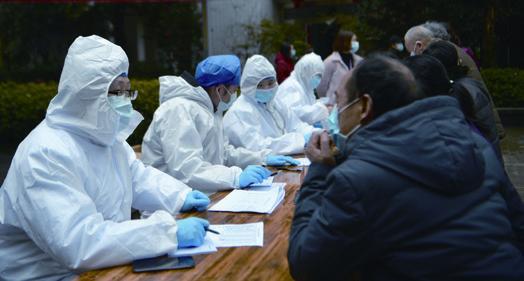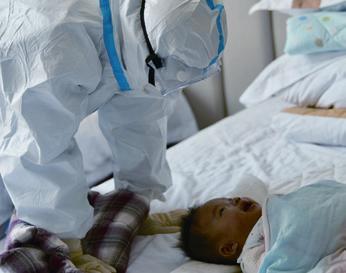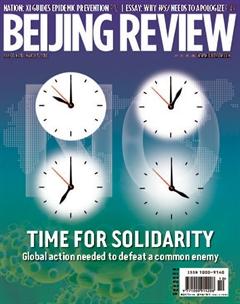Decisive Measures
By Shi Yanan
While China is progressing in its battle against the novel coronavirus disease (COVID-19), China and the Chinese people are being stigmatized in some parts of the world. Some Chinese and Asians are being discriminated against, harassed and even physically assaulted in some countries. These behaviors are contemptible, as China is making huge sacrifices to guarantee peoples health and safety and prevent the epidemic from spreading outside.

Right to life and health
The Chinese Government regards its epidemic control as a blocking action against the virus, implementing plans and measures to isolate and contain the virus and ultimately eliminate it.
Since no effective medicine has been found for this new virus yet, the most effective way to control the disease is through isolation, a necessary measure in the control of infectious diseases. Quarantine and its related procedures are written in Article 41 of the Law of the Peoples Republic of China on Prevention and Treatment of Infectious Diseases. It is also an important measure adopted by many other countries for epidemic control. Recently countries like the United States and Russia are using it for travelers coming from China.
Some foreign media outlets and critics have used the epidemic as another opportunity to attack China, claiming that the Chinese Government is violating human rights by adopting quarantine measures. It is true for individuals, quarantine means restricted freedom of action; for a society, it means business operations and transportation, among other things, are affected. Thus, quarantine measures adversely affect individuals and the whole society, especially the economy, with incalculable losses. But its all worth it to protect peoples life and health because the right to health is the most important human right and the foundation for any other rights. The Chinese Government aims to do its best to protect the publics right to life and health. A government that really cares for its people will slam on the brakes on a society running in full gear to block the spread of a virus because it is defending the most important human right, that of life and health.
During a serious epidemic, it is justified and reasonable for a government to impose certain restrictions on the range of peoples activities in order to protect their right to health. Moreover, the isolation measures and restrictions on activities adopted by the Chinese Government are supported by most of the general public, and the negative influences brought by these measures are being reduced as much as possible. Heeding the governments call, people have reduced their activities in public places to support epidemic control efforts because they understand these are for their benefi t and will help eliminate the virus as soon as possible.
Right to social development
These government measures are also in line with the principle of proportionality as emphasized by administrative law in the modern rule of law. It stipulates that before taking an administrative action, the government must consider the balance between public and personal interests. When a public interest of great signifi cance is at huge risk, personal interests must take second place. However, this does not mean personal interests will be completely abandoned or neglected.
Individuals daily life, production and activities will inevitably be affected, but such disturbances should be reduced as much as possible. The fl u occurs every fall and winter in China, but because there is adequate medical treatment to address the situation, the government will never adopt such extraordinary measures as isolation. In the face of COVID-19, which has no specific or effective medicine but has strong rate of transmission, the consequences would be unimaginable if the outbreak spun out of control.
The government adopted isolation measures after weighing the gains and losses, even when the losses appeared great. Cases of social havoc caused by plague in Chinese history also remind us to build consensus and pool our resources to control the damage a virus can cause and to safeguard citizens right to social development.
There have been some cases of people refusing to cooperate once in isolation and of others resisting isolation with violence and threats. Such behaviors are of great social harm since they will severely obstruct epidemic control. Particularly, resistance of isolation by suspected or confirmed patients may spread the virus and endanger the health of many others. Isolation in accordance with law is part of the public order during an outbreak period, so obstruction of these measures is also a blow to the public order.

To ensure orderly epidemic control, the Supreme Peoples Court, the Supreme Peoples Procuratorate, the Ministry of Public Security and the Ministry of Justice jointly issued a guideline on February 10 on punishment for deliberate virus spreaders. The guideline says people confirmed to be carrying the virus could be charged with endangering public security if they refuse to be quarantined or leave quarantine early and enter public places or take public transportation. According to Chinas Criminal Law, this will carry a heavy sentence.
Right to safe social environment
Security is an important public product in a society and must be provided by a responsible and capable government. In the face of a serious epidemic, a government needs to do its best to provide a safe social environment for the public, protect peoples health, and avoid public panic or society being torn apart. This really safeguards human rights and peoples interests. Human rights are protected through practice and real actions and not by empty words and groundless criticism. Being an onlooker and making no contributions to the fight against the epidemic is not a real human right practice.
There have been some malpractice involving local government staff during the quarantine work. These cases are fully reported by Chinese media and strictly punished and corrected by the government. However, these cases are exaggerated as violations of human rights and spread via social networks as an excuse to attack the Chinese Government. Full of malice, such views will not only lead to misunderstandings about the anti-epidemic work, but also encourage more discrimination against the Chinese in foreign countries.
The epidemic will not last long. When prosperity resumes, people will cherish social security more, including health security, and they will feel thankful for such resolute containment measures.

